#When he goes to look for him his story is framed as more heroic
Explore tagged Tumblr posts
Text
No one talks about how much more disturbing the Wittebros story would be if Philip was the older brother.
#the owl house#toh#emperor belos#philip wittebane#caleb witherbane#caleb wittebane#think about it#Philip raising Caleb to hate witches#and play the games he wishes he would have gotten to play as a kid#he enjoys them more than Caleb does#when he realizes that Caleb is drifting apart he becomes more controlling#When he goes to look for him his story is framed as more heroic#that of a loving older brother seeking to find his only family#when he finds Caleb he hurls everything he’s ever done for him back at his face#he is very resentful but when he stabs him he regrets it immediately#like he’s cradling him like a baby crying and screaming cuz he killed his little baby brother#and he insists on raising every grimwalker#and still kills them just as easily
67 notes
·
View notes
Text
۪ ݁ 이마크 — the anatomy of 'home'.
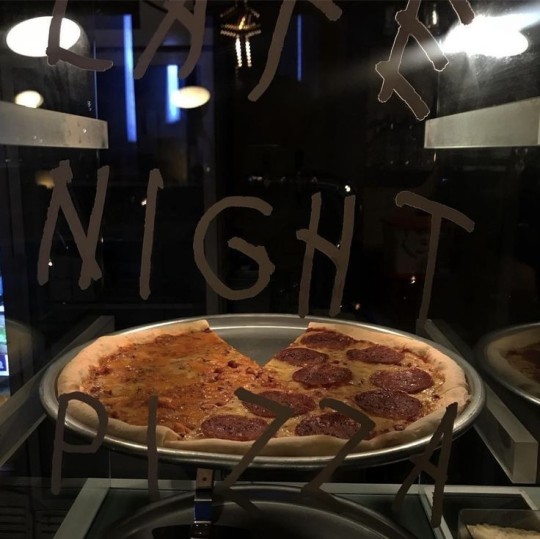


• SYNOPSIS .. neither of you have all that much to your name. but, here, in the small sanctuary of your brand new—and still very vacanct—apartment, with a mattress for bed, a small kitchenette yet waiting to filled with the smell of home and living off of takeout to your heart's content, you just might have the most priceless thing in the world: happiness.
♡ WORD COUNT .. 2.5k
☆ NOTES .. established relationship. you and mark talking through the night over a pizza picnic, that's the story. got way too poetic and in my feels at the ending and then fumbled it lol. happy first tumblr post to me, yay! :)
Lately the pep in his steps have been noticeable. Even the mundane task of picking up delivery and climbing five flights of stairs because the elevator still hasn't been installed in the building couldn't dampen his mood. Mark walks in through the front door, practically skipping, two boxes of pizza in his hand.
Inside is like a sea of knicknacks yet to find their rightful place in the one bedroom apartment tucked into the heart of a bustling metropolis.
You smile up at him from where you are sitting, unboxing the things your mothers had insisted on buying in the name of home decor. "Done chatting up the delivery guy?"
Mark rolls his eyes, setting the food on the kitchen counter which was overflowing with utensils left to be stowed away. His gaze stops at your Harry Potter mug, one of the few things finally freed from your incessant overdone packing with the wrapping paper to make sure nothing broke during transit.
If the cogs of his brain cleared from the fog of bliss long enough, he would vividly recall the story of winning it at a fun fair — a mere consolation prize as opposed to the big pygmy puff plushie he'd originally promised you. Still, no matter your carefully hidden disappointment he'd assume, you had kept the mug, taking it out every morning for it to enable your insane caffeine consumption.
Perhaps it's the fact he'd seen it with you so many times, warming your hands on a cold morning or staining the corners of the Sunday newspaper acting as paperweight, Mark had forgotten it was his to begin with.
"For your information, I was getting the scoop on the local restaurants. So when you come home too tired to cook, I can swoop in to save the day."
"So heroic, my knight in shining... takeout boxes? You know all this could be avoided if you just learnt to cook?" Your sarcasm is met with bubbling laughter, making you beam up at him. "Come here for a sec. How does this look?"
Raising a brow, Mark goes to stand right behind you, narrowing his eyes at the wall of cat pictures and movie posters framed above a white table that held up a shimmering and ridiculously fragile glass vase.
He frowned at a couple things he thought had long since lost, in his childhood home or the studio apartment he used to shared with three others which looked like it was struck by a hurricane on a good day, hung up on the tiny bit of space by his bookshelf.
Specifically a Wham! vinyl.
The one you'd bought Mark on his first birthday that you spent together as a couple. The effect of the years passed is visible on the not-so-shiny black surface marred with misplaced dents and scratches. Yet the 'I know you've wanted this for a long time. Happy Birthday, rockstar' written in black sharpie onto the center label is still as fresh as his memory of receiving it.
"It's pretty," he states finally, genuinely, and hopes to God he played it cool enough. But who was he kidding? Five years of desperately trying to be nonchalant wouldn't have been comparable to a second spent being yours. Mark adds as an afterthought, "Let's hope it stays that way if we stumble into it."
You can't help a snort, "If? More like 'when'. Your foot eye coordination is whack in the morning."
Mark lets out a scandalized gasp, pointing at you, "Take that back right now".
And you, being the responsible, independent, tax-paying adult, stick your tongue out at him making him shake his head before looking back at the picturesque nook in your new residence.
"We need to get some flowers for the vase, huh?"
"Hm? Oh, yeah", you smile over a stifled yawn, pretty and serene, stretching your hand up to your boyfriend. He takes it as cue to pull you up from the ground. His hand remains twined with yours even after you're standing. "Peace lilies. And maybe chrysanthemums for a pop of color?"
Mark finds himself grinning at your hopeful gaze, bringing your joined hands to his lips. "Anything you want. We can go first thing in the morning."
He feels his eyes widen when you cross the small distance between you, pressing a kiss to his jaw. "Thank you, you're the best," you whisper, brushing a few strands of his fringe away from his forehead before you moved away, leaving Mark standing there frozen like a statue. A very red in the face statue.
He thinks you know exactly how to make him weak in the knees.
You stand in the middle of the clustered living room, every inch of space on the floor filled with cardboard boxes and your belongings packed with bubble wrap. "I don't think we can finish this today. Plus, it's getting late. Let's just eat and go to bed, yeah?"
But everything you say goes in one ear and out the other. It's baffling how many times Mark would get stuck in his head over the smallest thing about you.
It's more of a habit he'd developed – or so his friends insist – back when he first met you at orientation on campus.
No, you weren't a wide-eyed freshmen and he wasn't one either. Yet, somehow the friend-of-the-world music major had managed to stumble upon the live art workshop your department had set up.
From then on, it was only ever "Did you see how beautiful her eyes are? It's like the whole galaxy is mapped in them!" or "She's so recklessly kind, dude! Today she ran into traffic to save this one old lady's cat! How much more perfect can she be?"
Mark Lee isn't a stranger to waxing poetics– hell, he does that for a living, writing lyrics with the power to make people laugh out loud, be a metaphorical shoulder for people to cry on, to feel so intensely with just words alone.
But then every syllable fails him when it comes to you, a soul so beyond the realm of letters and alphabets that nothing he could ever scrap together feels enough.
It's like the universe had decided from the very first moment you both locked eyes that this was it for him.
Mark knew it when you waved at him with amusement threaded into your expression from behind the stand you were running and he reciprocated shyly after looking around to make sure at least twenty times that it was indeed him you were waving at.
When Mark asked for your number after finishing a basketball game as state level champions because the adrenaline high of the win and the elation in having spotted you cheering him on as he nailed the deciding shot from halfway across the court turned him into his most confident self — only to be reduced to a stuttering mess when you saved his contact on your phone, blowing him a flying kiss goodbye before walking off alongside your giggling friends.
When his idea of a perfect first date to a fancy rooftop restaurant got rained on, and just when Mark was considering to never show you his face ever again, you both ended up in the backseat of his car on a McDonald's parking lot, talking and laughing and he found out that you were just as much of a rambler as him.
When a houseparty his friend Jaemin was throwing in their new shared apartment landed you on his bed, your lips like a safe haven, searing affection and praises onto his skin. That night Mark had been afraid to so much as go to sleep, scared that he would wake up to an empty room, and perhaps a half-assed note saying if he was a good fuck.
So he had stayed up till the wisps of dawn graced the city, holding you close and kissing your forehead over and over again. When you woke up, you had caught him in his bluff immediately, coming over that afternoon just to make sure he actually slept for more than an hour.
Mark thought love was a frightening emotion, too large for fickle mortal lives, too complex to fully comprehend.
And maybe he wouldn't really ever understand love in it's entirety, but he did see a version of it in you — one that was tailored for him and him only.
Mark knew it especially when after an entire year of flirty back and forths, holding each other through your biggest wins and losses, learning to be so well-versed in each other that it surpassed rationale, he asked you out.
You hadn't been particularly ecstatic, claiming you were going to ask him first but just as quick, your arms coiled around him in a tight embrace under the stars painted across the vast expanse of the universe witnessing that one deserted beach at exactly midnight.
Mark Lee fell in love with your smile but he kept falling over and over again for your heart. A heart that is irrefutably made of gold.
And he knew that if given the chance, he would remind you just how precious you are and how precious whatever it is you share is, over and over again till the sky falls.
It took Mark a while to bring you down from the pedestal he'd put you on, to accept that your love for him is as real as the existence of the world. Perhaps a speck of cosmic dust in the grand scheme of things but, to you, it is life.
That when you said "I want you to try hard, but try hard to be the best self of you. Mark, you're the sweetest, most hard-working person I have ever gotten the chance to know. So, please, don't take him away from me", you had meant every word.
It takes you snapping your fingers in front of his face to bring him out of his thoughts. You stand before him in a baggy t-shirt — one of his that you'd stolen ("permanently borrowed", you'd correct him) saying his detergent smelled better than your own — and your hair an untamed mess. You're the most beautiful person he had ever seen.
"Mark?" You whine again, cradling his face in your palms. "Baby, don't zone out again. Food?"
Huffing a laugh, Mark pulls you towards the kitchen island with a hand around your waist, "I'm here, I promise. Where do you wanna eat?"
You survey the living room that had turned into your temporary storehouse in dismay. "Dinner in bed?"
"Minus the bedframe, you mean?" Mark muses making you wail.
"Oh my God, for the last time, I'm sorry I didn't check the delivery date was so far away. Please forgive me, good sir!"
Mark clicks his tongue in faux contemplation, biting back a smile at your dramatics. "I'll think about it."
Pouting, you help Mark set the pizza boxes down by the matress in the middle of the bedroom floor, dragging him down to sit beside you. "What will it take for you to forgive me?"
"Hmm... A few kisses and maybe something else?" He smirks, wriggling his eyebrows and causing you to smack his chest.
"You're such a man," you hiss and then with a coy look, push him down to lay on his back as your straddle his waist. "Though, that can be arranged," you whisper low and sweet, but right as Mark's hands grip your hips, you roll away towards the food, "After we eat. I'm starving!"
"A minx, that's what you are!" Groaning, Mark drags you back into him, tickling your sides till you are begging to be freed.
Dinner goes on without either of you bothering to put something on the background. The T.V. isn't installed yet and though you have your laptops, the comfortable silence and occasional sparks of conversation are more than welcome.
"You think we were meant to meet?" You ask out of the blue, when the moon is high in the sky. There are empty pizza boxes crushed into the trashcan and two half-empty beer bottles rest by your feet. Your fingers trace mindless patterns on Mark's chest, nuzzling into his side while he leans against the wall as though it's a makeshift headboard. “Like there’s a huge, incomprehensible divine plan that we��re just... following?”
"Yeah," Mark says simply. Though you would loath to admit it, you admire Mark’s easy belief in his own convictions. "I think that people have, like, agency and responsibility and stuff, like – okay, so we met, but me asking for your number after that game, or asking you to move in with me was on me. The big stuff, that’s fate, or the plan, or whatever you wanna call it. But we can still choose where we go from there."
"So me and you — that’s the big stuff?" You ask teasingly, and nudge Mark with your shoulder.
He sputters comically, well-practiced indignation clear on his face, "Shut up, I’m trying to have a philosophical debate here.” But his pink ears betray him, a pretty flush creeping towards his neck.
"I kinda like the idea that it’s all random, though," you say. "Like, if everything’s a coincidence. If everything leading to this moment was just a lucky series of accidents. Don’t you think that makes it special?"
"I guess." Mark looks up at the clear doors leading to the balcony, one of the deciding factors in you settling for this building complex. The stars linger in the night like paint splattered on a dark canvas.
Back in his small shared rental, sitting out on his balcony at 3am smoking with his friends, he could count them on one hand.
The city is a graveyard of these stars, he has learned. Millions of wishes and dreams burdened onto the ones that make it past the blanket of smog just to be seen.
It takes him back to that small secluded beach in Busan, on a fleeting night amongst so many other insignificant ones. Two people, barely learning their place in the word, so utterly wrapped up in each other.
There, away from the glow of 10 million or so human lives, the stars were endless and shining in a way the city never lets them.
"It makes me feel like my life is really worth something," you continue, quieter, "If I’m here by accident, and I’m the product of so many billions of years of accidents. It makes me feel lucky. And it makes me grateful for the chance. To, you know, make something of that."
That night five years ago, maybe you both were different people, not at all the souls that remain in your body today. But if there's one secret of existence Mark had started to figure out, it would be that any version of him that came to be since you crossed paths, each one of them was utterly and irrevocably taken by the versions of you which followed.
And destiny may as well be a glorified lie crafted by people to make sense of this larger than life magnitude of adoration they can hold for another.
But Mark hopes, with everything he has, that destiny has led every variant of you and him across the universe into each others arms. Home.

©DALGOMII, 2024
#۶ৎ — 𝙢𝙖𝙧𝙠 ᵎ#mark lee x reader#mark lee#mark x reader#mark lee nct#mark lee imagines#mark lee fluff#mark lee scenarios#mark fluff#mark imagines#nct dream x reader#nct dream imagines#nct dream fluff#nct 127 x reader#nct 127 imagines#nct 127 fluff#nct dream#nct 127#nct imagines#nct x reader#nct fluff
556 notes
·
View notes
Text
At Mike Holmes' recent book signing, he stated:
Mike explains that he enjoyed illustrating Darkstalker's scenes in Talons of Power: Graphic Novel because he's a complicated character and he wanted to bring out his emotions and the parts that "you hate to love him or love to hate him." He's interested to see how readers react to those scenes and said he had fun illustrating it.
He describes Turtle as a very complicated character because he's not necessarily "heroic" like past POVs, and he's interested to see how readers react to his scenes as well.
He says the further the series goes, the deeper he gets into it and he finds it interesting to see how characters "bounce off" of each other and believes Tui makes their relationships work, which makes it fun for him to draw.
He says that the last frame from Escaping Peril: Graphic Novel with Darkstalker in it had to be redrawn 3-4 times because he kept thinking the drawings weren't right. The final frame we got he kept because he felt it had the right amount of fantasy (I think this is the word he said) and surprise.
He hasn't looked much into illustrating the third arc because as of now he's only set to do the rest of the second arc. He's trying not to look into it too much so he can focus on the books he's illustrating now.
He's just started drawing illustrations for Darkness of Dragons: Graphic Novel, saying he loves the way the story raps up (noting when he finished the first arc it felt like a "big weight off his shoulders") but is focusing on one book at a time despite his excitement for the second arc to end so that he doesn't become confused due to thinking about multiple books at once.
He says if he were a dragon tribe from Wings of Fire, he's thought long and hard about the fact he'd be a RainWing because he likes naps, and sometimes between drawing he takes naps and breaks. He appreciates that the RainWings are underestimated by a lot of the other tribes, and he feels that as he grew up there were things about himself that people underestimated due to him being smaller as a kid/teen, and people didnt expect much of him. He thinks the RainWings' powers are amazing despite the other tribes thinking they're lazy.
When he started illustrating the Wings of Fire graphic novels, he used his pets as models to try and put their energy and emotion into the characters.
His favorite duo to draw is Winter and Qibli (whom he pronounces Kibli because he's never asked Tui how it's pronounced) because he thinks it's really fun how they cancel out each other. He describes Qibli as living his life while Winter is more sheltered.
He also mentions Peril and Turtle as a duo he enjoyed drawing, thinking they couldn't be more opposites of each other. He describes Peril as always being used her whole life as a weapon which she's trying to move on from, but she's always at the forefront. He says Turtle was in the background his whole life despite his powers and nobody expected anything from him, but Peril's power has always been front and center and everyone knows what she's capable of. He says it's interesting to see how they bounce off each other, seeing how Peril pulls Turtle out of his shell while Turtle shows her how she can soften her approach. Mike believes the things they say to each other is funny.
He says he hopes everytime he draws for the Wings of Fire series that it'll cause a good reaction from readers.
Here's the video!
youtube
#wings of fire#wingsoffire#wof#wings of fire news#wingsoffire news#wof news#news#verified news#upcoming book news#mike holmes#event news#mike holmes wof#mike holmes wingsoffire#mike holmes wings of fire#wings of fire book signing#wof book signing#wingsoffire book signing#mike holmes book signing#wings of fire graphic novel#wings of fire graphic novels#wof graphic novel#wof graphic novels#wingsoffire graphic novel#wingsoffire graphic novels#talons of power graphic novel#talons of power gn#darkness of dragons graphic novel#darkness of dragons gn#escaping peril graphic novel#escaping peril gn
149 notes
·
View notes
Text
2024 Books Wrapped
"I think my heart knew you were mine long before I ever realized it"
"'If it's any consolation, cousin, I behaved rather poorly the other day.' 'Is he dead?' 'No.' 'Then I'd say you controlled yourself admirably.'" - A Court of Frost and Starlight, Sarah J. Maas
"He could still do it -- close his eyes and see her. But lately, white smudges would blur parts of her -- an earlobe, her eyelashes, the contours of her hair. It didn't happen enough to full obscure her yet, but Teddy feared time was taking her from him, grinding away at the picture frames in his head, crushing them." - Shutter Island, Dennis Lehane
"The map had been the first form of misdirection, for what was a map but a way of emphasizing some things and making other things invisible?"
"This part I will do alone, leaving you behind. Don't follow. I'm well beyond you now, and traveling very fast." - Annihilation, Jeff VanderMeer
"He did not want to leave the world, and yet he knew now that he was leaving it, or that it was leaving him."
''What if there is no world out there? Not as we know it? Or no way out to the world?' Grace saying this, while existing in that moment in a world that was so rich and full." - Acceptance, Jeff VanderMeer
"'I fucking hate you,.' The words are past my lips before I can shut my mouth. 'That doesn't make you special.'"
"'I know you just want to keep me safe, Dain,' I whisper. 'But keeping me safe if keeping me from growing, too.'"
"He'd protected me when I needed and taught me to defend myself so I wouldn't require protection forever. And when others are quick to stand in front of me, Xaden always stands at my side."
"Funny how people rename everything that makes them feel uncomfortable. We lost faith that our king would ever do the right thing. And they call us traitors." - Fourth Wing, Rebecca Yarros
"This, then, explained why he did not like them. He was appalled by their appearance. Medusa wanted to laugh but she was still afraid. As if anything that was important about Sthenno or Euryale was visible in their teeth or their hair."
"But Athene was no musician, and nor was she looking to play a tune. The first flute therefore sounded exactly like what it was. The desperate cry of a reed that has been severed from its root."
"I don't feel like saving mortals any more. I don't feel like saving anyone any more. I feel like opening my eyes and raking in everything I can see whenever I get the chance. I feel like using the power the goddess gave me. I feel like spreading fear wherever I go, wherever Perseus goes. I feel like becoming the monster he made. I feel like that." - Stone Blind, Natalie Haynes
"'It is as Gio said. Searching for a connection. Making something out of nothing so the spaces between us do not seem so far."
"'A flaw?' He laughed loudly. "Of course it is! Your flaws are what make you superior, in all ways. No matter what machines can do, no matter how powerful we become, it is the absence of flaws that will be our undoing. How can this existence survive when all machine-made things are perfect down to a microscopic detail? When all machine-made music is empty of rage and joy? Our only flaw is that we've condemned ourselves to spend eternity mimicking that which we deemed unfit to exist.'" - In The Lives of Puppets, T.J. Klune
"He had worn so many men's blood over the years, what difference did one more make?...He wondered if anyone else has ever died saying the words, 'Thank you.'"
" If he truly wants to understand the nature of the epic story I am letting him compose, he needs to accept that the casualties of war aren't just the ones who die. And that a death off the battlefield can be more noble (more heroic, if he prefers it that way) than one in the midst of fighting. But it hurts, he said when Creusa had died. He would rather her story had been snuffed out like a spark failing to catch damp kindling. It does hurt, I whispered. It should hurt. She isn't a footnote, she's a person. And she -- all the Trojan women -- should be memorialized as much as any other person. Their Greek counterparts too. War is not a sport, to be decided in a quick bout on a strip of contested landed. It is a web which stretches out to the furtherest parts of the world, drawing everyone into itself." - A Thousand Ships, Natalie Haynes
"Nothing good grows out of fear." - The Near Witch, V.E. Schwab
"But I don't miss the woman I was, the one who didn't know her strength."
"Violence, remember it's only the body that's fragile. You are unbreakable."
"Now cease this line of thinking. It does not serve to make you stronger." - Iron Flame, Rebecca Yarros
"Don't fall asleep until you've really thought about the statue and Michelangelo and the entire Italian Renaissance." - From the Mixed-Up Files of Mrs. Basil E. Frankweiler
#books wrapped#mine#ACOFAS#sarah j maas#shutter island#dennis lehane#annihilation#acceptance#southern reach trilogy#jeff vandermeer#stone blind#natalie haynes#natalie haynes if you're reading this I love you#a thousand ships#in the lives of puppets#tj klune#rebecca yarros#iron flame#fourth wing#the near witch#ve schwab#from the mixed-up files of mrs. basil e frankweiler
7 notes
·
View notes
Note
Hi, I just needed to get this thought out of my head for a moment, I hope you don’t mind me dumping! Of course, you don’t need to answer either, I just really needed to get it all typed out.
So, we know that NRC is based on the Great Seven—‘villains’ that have, presumably, won in their respective tales. Everything in NRC is centered around them, being ‘villainous’ is the norm and encouraged in the students.
But then, if all of Twisted Wonderland is based on successful villains, why is RSA on the very same level as NRC? They’re even on the same island, for Seven’s sake. They regularly compete against each other in various ways and RSA wins more often than not.
That means it’s highly unlikely that all the villains won in TWST.
So, and bear with me here, what if RSA was based on successful heroes instead? Like, the Great Seven obviously succeeded in their fairytales, but what if there were fairytales that went the way we know them, or very similarly?
That would explain why RSA exists on the same level as NRC and them winning isn’t, like, a scandalous thing. Both schools are based on the winners of fairytales. Different fairytales.
And if you followed my train of thought until here, I’d love to hear what fairytales you think inspire RSA!
Okay, thank you for allowing me to use your inbox for this, feel free to ignore. Much love for you and your writing!!❤️❤️
My very first thought was that in twst, yes the characters we know of as Villians are seen more heroically, and as the 'good guys' BUT! The hero's stories still seem to exist too. This is clear, especially with Aladdin, where they talk about Jasmine and Aladdin and their story, just as fondly as they do the "Sorceror of the Sands." This one I specifically tried to reconcile in one of my fics, where I altered Jafar's character to be the one Jasmine had always been in love with, and couldn't marry because he wasn't technically royal, and Aladdin and the Genie were framed as the villains looking to deceive them. This allows both Jasmine's story and Jafar's to both be told as if they were the true heroes.
There are concepts from the Disney TCG called Lorcana, of "Floodborn" and "Dreamborn" versions of the characters. I made some posts about it early on when I first rejoined Tumblr, but basically, the idea that the Ink came and changed the Character's stories fundamentally. Dreamborn for example would be close to what we have with Twist, where it presents versions of the villains where they won. Floodborn completely changes their origin story (You get things like Cinderella who trained all her life to be a Knight, and Gaston who is a genius.)
Given how the world of Twist is infected/corrupted with blot, and what happens to our cast when they accumulate too much of it, the idea that the ink/blot itself is responsible for these changes isn't far-fetched.
So you do end up with things, where the villain wins and is considered successful and someone to look up to, but you also have hero characters that are still just as well regarded. Something that from what we know holds true in Twisted Wonderland.
I think this supports your idea here of RSA being just as important while representing "Traditional Heroes" as we know them (with certain notable exceptions like Silver and Kalim, but this also leaves the door open for more traditionally 'villainous' characters at RSA)
So applying the same idea I did with Aladdin, maybe the version of the story here, Ursula did in fact help Ariel unite with her true love, and escape a difficult home life (Say Triton instead of acting like a concerned father, taking his anger issues further than just destroying her things in a fit of rage, leaving him more concerned with control than his daughter's well being)
We know, a Twist version of Snow White, the Cheshire Cat, and Ariel exist (off hand I can't remember if they mention Prince Rielle goes to RSA or not, but I think it would make sense if he did.)
As for who else attends RSA/ what other fairytales are represented there. The school has a very Cinderella feel. While I myself believe in the Caterella theory (that Cater is a representation of Cinderella in twist) it wouldn't exclude other Cinderella characters, like Prince Charming or The Fairy Godmother from having representation there.
Twist seems to focus on 'classic' Disney movies, and while I don't see any reason twisted versions of more modern characters couldn't be there, (especially with the new upcoming JPN event. I won't mention what for spoilers sake, but if you're interested its easy to find the info) I'll focus on those classic films.
Peter Pan is a good canidate. We don't have a Hook equivalent at NRC, BUT like I said before thanks to the anomalies at NRC, there is no reason he couldn't be at RSA along with variations of Pan and Wendy, etc. Him having some kind of rivalry with Pan could be amusing.
Sword and the Stone with Arthur is also a good guess. With Merlin as a professor. Also versions of Hercules, in contrast to Idia at NRC would be interesting. Belle as a librarian etc. There are a lot of possibilities here.
Anyway, I hope this was at least close to what you were expecting. Thank you for the ask :)
#twisted wonderland#twst#twst thoughts#scarabia#octavinelle#kalim al asim#jamil viper#heartslabyul#cater diamond#night raven college#royal sword academy#disney
17 notes
·
View notes
Text

The Malevolent Seven by Sebastien de Castell
Rising fantasy star Sebastien de Castell returns with a bold and highly entertaining new fantasy novel, The Malevolent Seven, that takes several dangerous and dastardly characters on a magical journey of death, deceit and despair which is so much fun to behold.
Magic is power and only the strong can hope to wield it, especially if they can make a profit out of it. Cade Ombra is a powerful wonderist, a magic user who makes his living as a war mage, selling his services to highest bidder to fight in their wars and kill their enemies, even if his employers are monsters. Cade has long struggled with the ethics of his job, and when his latest employment ends badly, with Cade framed for murder resulting in a relentless band of holy enforcers hunting him, he knows he needs to find a way out.
Luckily, a lucrative new job is looking for wonderists, and the payment is something he’s always desired, an artefact capable of changing everything about his life. However, to get paid he needs to do one last very bad thing: kill seven heroic mages attempting to take down a corrupt noble and survive everything that wants to kill him along the way. Determined to win no matter the cost, Cade and his violent colleague Corrigan set off to claim the reward before any of their rivals can. But to succeed, they’ll need to recruit five more mages capable of taking down their powerful enemies and who have no moral qualms about killing heroes for money.
So begins a deadly recruitment mission as Cade and Corrigan seek out five mages just as crazy as they are. But even with a mentally unstable blood mage, a fallen angel, a moral demon knight, a charismatic rat mage and a mysterious jackal, can even this mismatched bad of rogues hope to survive against the seven most deadly magic users on this plane of existence? However, nothing about this job is as it seems, and Cade and the Malevolent Seven find themselves caught up in a deadly game between gods, demons and monsters, with the fate of the world lying in the balance.
Wow, now this was a very, very fun and addictive novel. Sebastien de Castell wasn’t an author I was too familiar with before this point, although I had heard good things about The Greatcoats series. However, I am now going to have to go out of my way to read more of his stuff, especially after reading the epic and entertaining The Malevolent Seven.
The Malevolent Seven was such a great read as de Castell pulls together a dark fantasy reimagining of heroic stories like Seven Samurai and The Magnificent Seven. The book starts of strong with a great introduction to the main character, Cade Ombra, the rules of magic in this realm, and the author’s very entertaining and outrageous sense of humour. Expertly and hilariously told from the first-person perspective of Cade, whose observations about the insane events going on around him adds so much value to the story, you soon get a great sense of what to expect from this book and de Castell does not disappoint. The story initially focuses on Cade and his friend Corrigan’s efforts in a brutal war for a mad ruler, but things go south when their employer is killed, Cade is betrayed by his fellow wonderists, and a band of ruthless religious warriors, the Glorian Justiciars, arrive determined to hunt down Cade for his use of demonic magic. Forced to take a new job with Corrigan to save his skin and quickly get out of dodge, the two take up the mysterious contract to kill seven heroic mages in exchange for a powerful artefact, and begin a recruitment drive for five additional mages.
I love a good recruitment montage in heist or action fiction, and this one is pretty damn fun as de Castell writes in a particularly eclectic and insane group of mages for the protagonists to recruit. Naturally nothing goes as plan, as the two are forced to take along a half-insane junior blood mage who Cade feels responsible for. Their subsequent recruitment attempts land them in all manner of trouble as they rescue a highly chivalrous rat mage, save a mysterious fallen angel from a pleasure ship, journey to hell to recruit a demon knight, and end up in the middle of a wasteland, chased by everyone. This recruitment period took up more of the plot than I thought it would, but it works really well to tell a great overall narrative. Each scene introduces the reader to more of the world and it allows a compelling dynamic to grow between the various protagonists, especially as they grow to understand each other crazy tendencies. De Castell also builds up several intriguing long-running storylines of manipulation and betrayal as it becomes clear that someone is influencing their mission and has set gods and demons against them. This middle section of the book is a lot of fun, and I loved how de Castell keeps up the same blend of humour, intriguing character development, and insane over-the-top moments, that really draws you in at the start of the novel.
Everything perfectly leads up to the final third of the book, when the protagonists arrive at their destination. Of course, as can be expected by the theme of this story so far, nothing is what they thought it would be, and instead they find themselves facing off against a mysterious foe with very different motivations to what they expected. I loved how de Castell turned the plot a little on its head at this point, as the characters find themselves in the unexpected position of being the good guys. This leads to some amazing scenes in the final third, loaded with magic, chaotic confrontations and more, all of which is a ton of fun to see. There is some great character growth as several storylines come full circle, as well as a ton of twists and turns. I loved some of the epic reveals that came across, and while I saw a few coming, de Castell managed to surprise me in places, which I really enjoyed. The final twists about why the characters were on the job and who really wins were pretty damn epic and it sets the story up nicely for a sequel, which I am definitely going to grab a copy of. I loved how de Castell really enhanced the drama in this final third of the book, especially as several character relationships or conflicts come to the boil in some explosive and captivating ways. This combines really well with the continued craziness of the story and the inherent humour of the plot, and you really get drawn into all the fantastic elements of this book. The Malevolent Seven ended up being an incredible read, and I managed to power through this entire story in a couple of days and had a ton of fun doing so.
I loved the dark and despairing world that served as the cool new setting for The Malevolent Seven and de Castell has a ton of fun showcasing this new fantasy landscape throughout the book. Loaded with petty tyrants, warring nobles, and wandering wonderists who dish out death to the highest bidder, this land is the perfect backdrop for the crazy and self-serving narrative, and I loved seeing de Castell’s great characters traverse it causing trouble. While there are some outstanding locations, including a magically blasted wasteland and several deadly battlegrounds, the highlight of this setting is the complex magical system that the author came up with. This magical system is primarily predicated on wonderists breaching dimensional barriers and utilising magic that they have an infinity for. This results in several unique rules and abilities that de Castell did an outstanding job of effectively introducing, and I loved how weird some of the abilities were, especially those that played into the novel’s humour. Some of the more interesting realms require the magical users to interact with the associated denizens, including this world’s equivalent of angels and demons, all of whom have a stake in the mortal realms. Several of the best scenes in the book require the protagonist to make dark and forbidden deals with his demonic contact, and the manipulation of the various mystical entities from both heaven and hell becomes a key part of the book. The author makes sure to utilise all these fantastic and lethal abilities to their full extent throughout The Malevolent Seven and the epic, ultra-destructive battles that emerged, as well as the clever combination of talents, resulted in some amazingly, electrifying sequences. It will be interesting to see what crazy abilities de Castell brings to the table for the sequel, but it’s going to be good.
The final thing I want to highlight about The Malevolent Seven are the excellent and compelling damaged characters featured throughout the plot. De Castell really went out of his way to make his main seven protagonists as random, broken and insane as possible, and this really works in the context of this brilliant story. The main protagonist is point-of-view character Cade Ombra, a wonderist with a secret past whose current magical ability comes from deals with a literal demon (nice guy actually). Because of this and many other mistakes in his life, Cade is pretty alone and damaged when the story starts, and he is constantly trying to balance his survival instincts and desire for power, with his conscience, something that keeps getting him in trouble. De Castell builds up Cade extremely well throughout The Malevolent Seven and I liked his constant growth as he tries to do the right thing, even though it usually makes life even harder for him. The author sets Cade up as a reluctant leader and hero, and it was intriguing to see the dynamics that form between him and the rest of the team fate brings together around him. The rest of the titular Malevolent Seven are all pretty entertaining and uniquely crazy in their own way, and the range of diverse and entertaining personalities makes for a great overall dynamic to the story. My favourite character in the group was the excessively violent Corrigan Blight, whose thunder magic matches his outrageous personality. Corrigan served as the straight speaking, highly reactive and trigger-happy organiser of the group, who plays off the more reserved Cade perfectly, especially as they form a unique and fragile friendship. Other highlights include the highly charismatic and surprisingly noble Aradeus, whose rat magic proves to be highly effective if a little weird, and the novice blood mage Galass, whose spunky personality is only matched by her deadly abilities that are slowly driving her insane. I loved this impressive and very entertaining cast and I cannot wait to see what happens to them next.
I think it is very clear that I loved The Malevolent Seven as Sebastien de Castell’s outrageous and inventive dark fantasy tale was a real joy to behold. The great blend of fantastic humour, twisty storytelling, brutal magic and over-the-top characters, works exceedingly well and I loved the witty and extremely fun story that emerged. The Malevolent Seven is a great read and if you are in the mood for a cool and highly compelling fantasy adventure than this is the book for you.
5 notes
·
View notes
Text
Fixing Insomniac's Venom
I loved Insomniac's Spider-Man 2 and if I'm being honest it was all great until Venom became a mustache twirling villain.
Venom has a great appearance, the fight was good, but his motivations was bad. Wanting world domination and pulling Web of Shadows and just the personality of a brick.
So here is how I would've changed Harry as Venom
TLDR;Dive into Harry wanting the power and feeling like Peter is stealing everything from him, the suit, his fathers love, any chance of survival. Have Harry's motivation then to take everything from him convinced that was what Peter wanted to do to him.
Have the game build up that Harry pretty much gets addicted to the suit doing heroics with Peter and Miles as “agent venom“
When Peter gets the suit, Harry slowly descends into jealousy with him having not just his cure, but his new method of really healing the world
Side note. I would've added Eddie Brock into the story. He's Peter's old rival at the Bugle and now has it out for MJ. He's a really skeevy and shady Fox News/Freddie Lounds type reporter. We help MJ prove he's a fraud and get Brock fired from the bugle. Then in the fight against Kraven or The Lizard, we destroy Brock's house and later his girlfriend leaves him. Eddie hates Spider-Man, MJ and Peter Parker and this leads him to the ending where the symbiote falls on him in the end.
Once the whole shit show of Peter going insane happens and is done with the symbiotes back at oscorp
Norman and everyone won’t let Harry near the thing anymore
But this time he goes to Harry noticing that he’s with the Symbiot and it’s like containment unit
He is also dying himself and gives him a little speech about they shouldn’t let us just with away. They should let us have all the strength that we can
To be The best version of ourselves
He released the symbiote and let Harry bond with it and tell him to meet him at Times square to fulfil his last wish
To fight the ultimate predator
Venom is born
The whole thing happens in Oscorp, but it’s not security that you’re fighting. It’s just hunters.
Venom kills kraven
This time Harry goes back to Oscorp looking normal
He pretty much tells Peter to go to hell and Norman is too occupied with the fact that is so in his healthy and the suit isn’t corrupting him from what he’s seeing
Harry then makes a speech outside of the Emily May foundation in the next days
He now declares that he is agent venom and then uses the footage of himself killing kraven and frames Peter for being this monster
This is way more personal venom that also ties in with the themes of addiction and Harry’s goal of healing the world
Instead of it being an invasion, force of aliens
It’s the symbiote and Harry using their combined hatred of Peter and desire to be a hero that they want to be a better Spider-Man
Then obviously later down this rabbit hole Harry will fight Peter and Miles as the normal venom behind closed curtains and eventually when he is outed in the public
So to sum it up. Harry gets addicted to being hero. Starts to resent Peter. Set up agent venom persona as the new hero. Uses his monstrous venom form to frame Peter. Eventually is outed, defeated and add a scene of the Venom symbiote falling on somebody else(obviously Eddie Brock to set up the Venom game)
#Marvel#Insomniac's Spider Man 2#Insomniac's Spider Man#Venom#Harry Osborn#Peter Parker#Spider Man#Norman Osborn#Eddie Brock#Insomniac Universe#Insomniac Harry Osborn#Insomniac Venom#Insomniacverse#My Changes
11 notes
·
View notes
Note
A bit of a vent, if that's okay; I think one of the most frustrating things regarding this chapter has been the overall behavior from the fandom, and this sort of mandatory love for anything from the manga. I get it, when we love something we can't bear other people talking bad about it (I'm the same way with some things), but it's annoying how a lot of us haven't been allowed to criticize or show any anger/disappointment about the chapter. It's upsetting, especially as an Izuku stan, to see other accounts (famous accounts too) claim that if we're disappointed with Izuku then we hate his character. That we're too stupid and cynical to think Izuku did anything wrong at all and wasn't allowed to defend himself. That we can't read if we think Izuku and Bakugo killed Kurogiri, or that Izuku wasn't able to save Shigaraki because after all he did free him from his abuser and made him recognize that he was in fact a crying child. And to each their own I suppose; but putting interpretations of arcs and narratives aside, this overall superiority of "there's nothing wrong with this chapter, you just don't get it so shut up" and the undermining of how a lot of fans feel is seriously infuriating. (Maybe this is how people felt when I'd argue that Armored Might wasn't character assassination lol). I'm just tired of getting called every name in the book for having my own criticisms, and getting accused of hating Izuku, or seeing Shigaraki stans undermined as if they weren't aloud to feel sad about it. Because it's exactly why people loved those characters and arcs so much that they feel such a strong reaction to 423. I'm upset with the weird ooc behavior and lack of introspection from Izuku because I love his character so much. And I'm upset with this chapter because I love this manga and wanna see a well written conclusion for the characters and story.
Nah, I definitely feel the same. So many fans have been taking the words of upset Tenko and Izuku fans out of context (or even outright twisting their words around) and using it as an excuse to be bullies. I'm sorry if folks have been harassing you.
At any rate, I think you have every right to criticize the chapter. Like, I'm very much a silver-lining-look-on-the-bright-side type of guy-- and even I'm having trouble finding anything to like about it lmao 😭. Basically, I liked AFO's conclusion... on the surface, at least. But then my mind goes right back to thinking about Tenko and how AFO's conclusion/treatment is yet another thing that ultimately contributed to his death, and I get mad all over again lmao. Like, an ending where Tenko gets turned into a "cautionary tale" that "everyone learns from" is pretty much the last thing I wanted for his character. It's basically ~*~building a better society~*~ on top of his corpse. And what exactly is his life/death cautioning against exactly? Grooming?? Stranger danger??? Being kidnapped by literally the worst guy alive when you're five years old and getting brainwashed into believing you were born evil???? LARPing????? Like.... it just feels like all of Tenko's suffering was ultimately just used as a stepping stone in order to finally rid the world of AFO-- and like, rationally, I know this isn't the case and I'm oversimplifying things, but like.. the way the rain stops and the sun starts shining as Tenko evaporates... uuuuoohhhgh---
*cough* Anyway! I'm also a staunch Iron Might defender, but like. In that particular case it was very obvious to me why Iron Might was necessary + a fitting end to Toshinori's arc. In Izuku's case, I simply cannot see how chapters 420-423 ultimately do right by his character. Since chapter 1, Izuku becoming "a great hero"/"more heroic than anyone else" was always tied to his drive to save when no one else is able (or willing) to. So these chapters being framed as the "climax/finale' of his character arc-- these chapters where he doesn't stop to think about saving Tenko at all and just focuses on wiping AFO out-- betray the very core of his character while also betraying the very premise of the series. Like. This is bad. This is bad bad and I sincerely, honestly want to believe Hori has something up his sleeve that'll somehow fix things. 😭But even if it is a fake out, and even if Hori reveals Izuku had some sort of plan all along... I don't think it'll undo the damage to the readers' trust atp, sadly.
(Like...! So many of Izuku's defining moments involve him standing up to abusers on behalf of their victims. The moments that define him as a hero have him encouraging those victims to fight back and reclaim agency over their bodies/powers-- but even though Tenko ultimately did fight back, it feels disingenuous to give Izuku any sort of actual credit in this situation bc, again, Izuku wasn't thinking of Tenko at all while he was beating Tenko's body AFO into dust lmao. Like I've been saying, so much of 423 is just indefensibly bad writing and Izuku and Tenko's characters deserved better than this).
17 notes
·
View notes
Text
im going to be utterly deranged and spoiler heavy for monogatari and call of the night (specifically the manga) here but thats your warning
see the thing is that like. mahiru and kiku's arc is like such a weird perfect foil to koyomi and kiss-shot/shinobu's arc. both are a vampire who wants to die, and a human who inexplicably comes and to the vampire appears to fulfill their wish, but the human chooses to disregard the vampires opinion in order to meet their own desire. kiku just wanted to actually truly die. kiss-shot was looking to finally die. they both found their human through chance, either unexpectedly fulfilling plans or readjusting them for a better path. the real core of what makes them different, is the humans, specifically in how they subvert the desires of the vampire theyve met.
kiss-shot's death specifically in reguards to koyomi serves as a direct parallel to his own moral code. kiss shot doesn't want to die any old way, the second she really starts to be near death at the start of kizu she's desparate for koyomi to save her. kiss shot wants to be a martyr. kiss shot chooses to die as a "heroic sacrifice" for koyomi to regain his humanity. sadly for her, koyomi does the exact same back to her, and sacrifices his shot at humanity again to "save" her. kiss-shot's death is undone by the nature that she tried to inflict on someone else.
kiku and mahiru arent as perfectly connected the way koyomi and kiss-shot are, partially due to a large part of call of the night being pretty clearly on the fly narrative writing done by kotoyama (please season 3 confirmation too, itamura is so good at improving the rough edges of early cotn's narrative i cannot wait for an anime adaptation of the kiku arc), and more largely due to the fact that kotoyama is Not Nisio Isin. even so, they both are in a sense, saviors to each other, more explicitly through love. which. yknow. is unsuprising considering call of the night has from chapter 1 been kinda obsessed with weird angles on it but. not to tangent much. mahiru essentially gains his only way of handling his mothers mistreatment of him through not just meeting kiku as a teenager, but meeting her as a child after the loss of his brother and gaining a frame to process the world that works for him. i think the obvious angle with kiku wanting to die and mahiru being a real shot for her finally is pretty clear, but i think the process that a vampire falling in love with a human goes through is just as interesting of an angle to explore for this. her heart starts beating again. she loses vampiric powers. she becomes human again through mahiru. of course, like koyomi, mahiru ends up essentially "betraying" her wants on from the two of them, but in an entirely different way. she desparately wants him to live after, gives him guides to stay safe, teaches him how to destroy every single personal posession so nothing could be used against him once he turns and she's not there to protect him. the tragedy is that kiku is as inexperienced as every single other person in the story when it comes to love. why would mahiru want to live afterwards? when given the option of living without one of the 3 people in the world that made anything worth living, or dying, he chose death.
i think theres probably a lot more to say, i love that they both pose the question "what would you choose, either you living and your partner dying or you both dying" and mahiru answers honestly with both dying while koyomi scribbles both answers out to go "what if we both... half die?"
sorry for all of that im going to go explode now
#monogatari#call of the night#miri.edu#this is like barely legible im sorry#also#for those curious#kiss-shot because i am explicitly referring to kizumonogatari#shinobu has gone through so much change through koyomi that i think they are much better analyzed as different characters
5 notes
·
View notes
Text
Fire and Hemlock Readalong: Part 2 Chapter 3
Another quiet chapter in which not much seems to happen - Polly even comments on it in the text - but a lot of things are set in motion.
Polly goes to visit Tom again, and he asks her to find Tan Coul's companions in a photo of the orchestra. It's he who asks "could Tan Audel be a woman?" and Polly is hugely embarrassed that she had never considered the possibility. Thus far the women in the Nowhere stories have been the female stock characters in most heroic stories - Edna, who is awful, and Hero, who is pretending to be a boy. Once again, women in the real world prove to be more interesting and complex than in stories, but now Polly is becoming consciously aware of it.
This chapter is also full of Polly's growing awareness of sexuality. Note that it is awareness, but not understanding. David Bragge gives her money in exchange for something she does not quite understand - her silence after seeing him with another woman, though the significance is lost on her. On the train back from London, Seb is very interested in talking to her - or talking at her, really, since Seb is one of those guys. - and she does not understand why. But she's starting to be aware that there is something happening that she does not understand, rather than simply not noticing things. Encountering Carla the Landlady again:
Polly asked, feeling rather mature, "Is Carla a one-parent family?" "No," Mr. Lynn said. "I think there are several Mr. Carlas. It's rather confusing. "Oh," said Polly, and felt childish after all."
Polly is in that very messy part of growing up where one is constantly bouncing between feeling too old for things and too young for things and being hugely embarrassed about both. Diana is so good at capturing that teenage awkwardness in ways I don't really see anymore. Part of why I think Diana Wynne Jones might have been ace is because the way she writes about teenagers becoming aware of sexuality makes sense to me more than 99% of modern YA novels where people are having feelings, recognizing what those feelings are, and acting on them, among a group of peers who are all having similar feelings. Does the world really work like that? I don't think I have enough of a frame of reference to know which is more typical.
Other things to note: Polly is still working mostly working on instinct in dealing with the Perry Leroys.
She knew she had broken the rules by seeing Mr. Lynn, which was what allowed Mr. Leroy his revenge.
In a way that's also a metaphor for growing up; you find yourself in a world of strange and shifting rules that no one has quite explained to you and no one wants to explain to you, but you get punished severely for breaking them.
The chapter ends when Tom convinces Polly to gives fairy tales another try - another way she is bouncing between the "too old" and "too young" - and she dutifully picks up "East of the Sun and West of the Moon." The title is another Nowhere reference; the content is an extremely obvious clue that Polly doesn't quite get. She is "too old" for fairy tales, but too young yet to realize that "well if I were her I would simply not have looked, rip you but I'm different" is not really the main takeaway.
To paraphrase that one tumblr post about Orpheus and Eurydice (which is another variant of East of the Sun): Of course it's a metaphor for grief, and who among us has not looked back in grief?
In Polly's case, it's a metaphor for knowledge, and maybe other things too. And actually, she has no right to judge the girl in East of the Sun, because she's doing the same thing. The Leroys are telling her to stay away from Tom or else, and she continues to see him anyway.
[editing to add bc I am v tired and forgot: The Obah Cypt! We have our first mention of the Obah Cypt! We don't know what it is - possibly a container, but no idea what is inside - but we are searching for it, because all good heroes need a quest.]
5 notes
·
View notes
Text
Movie Review | The Corruptor (Foley, 1999)
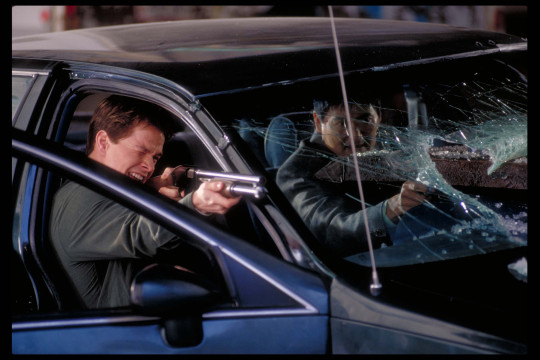
I understand this doesn't have the greatest reputation, but I think one thing it deserves credit for is that it treats Chow Yun-Fat like a real actor. I think if you compare this to other moves in that wave of Hong Kong stars trying to break into American cinema, you can see how they're often forced to tone down their essence or put into roles ill fitting for their kind of charisma. If we're going the buddy cop route, you have Jackie Chan at maybe 60% in Rush Hour and Jet Li being stone faced in Lethal Weapon 4, and even going back a few decades earlier. Here, Chow is allowed to retain his immense magnetism, allowed to exist in shades of grey, neither too heroic nor too unrepentantly corrupt, and allowed to essentially power the movie forward and have agency. I don't know how things went down behind the scenes, I'd like to think that James Foley, with his background in directing dramas, was able to grasp why this guy was such a great star and was able to do justice to those qualities. So if you're a Chow fan, as everyone should be, this is worth a look.
I'm even going to go to bat for Mark Walhberg. I see a lot of reviews bringing up the part where he puts on glasses to look smart, and... fair enough. And I don't think that he's able to sell his character's moral grappling, no matter how many brooding faces he puts on. (More evidence of what a great actor Chow is: he's able to almost singlehandedly sell these discussions and make Wahlberg sporadically look like a good actor. When the characters discuss their inevitable corruption in this environment, Chow sells not just his own internal conflict, but by extension Wahlberg's as well.) But I think Wahlberg's best roles (Boogie Nights, Three Kings, Pain and Gain) show him squirming as he's out of his element and unable to hide behind an alpha male facade, so I can appreciate the thinking behind his casting. I should also note that his performance here could have been a lot more offensive. Imagine this movie made a few years later, where he goes full bozo mode and spends the entire movie shouting and being a colossal prick. He could have been like a white Chris Tucker in Rush Hour 2. Think about how horrifying that movie would have been, and appreciate how his inoffensive performance here helps the movie dodge that bullet.
So you got a really good Chow performance, and a better than it could have been Wahlberg performance, and you got Foley directing this thing like an actual crime drama with some very nice cinematography giving it a nice and gritty mood. And you even have some not terrible action scenes, which are basically a watered down approximation of John Woo's style (lots of slow motion, arresting lighting choices, bodies being hurled, but cut faster and framed tighter than the real thing) and therefore automatically better than 90% of action scenes today. But I do think that's where the movie starts to fumble, as the action elements feel perfunctory and cause the story to be neglected. This obviously takes Year of the Dragon as a model with its cops vs triads plot and consideration of morally compromised tactics in such an environment, but this lacks that one's attention to detail (the triad scenes here feel brushed over and are mostly sold by Ric Young's performance as an ambitious underboss, while the other movie went to pains to sketch out the mechanics of the operation and the interpersonal dynamics between the leaders) and its willingness to be unlikable (without giving away too much, punches are definitely pulled in how the movie wants us to feel about these characters, whereas Mickey Rourke's character is allowed to be magnetic and ugly in ways that challenge the viewer almost to the end). And where that movie's action scenes played with a certain hysteria that felt like the movie and its hero kicking into high gear, the ones here feel like they're trotted out in the service of studio quotas. And even worse, when they're mixed with the moody aesthetic of the rest of the movie, the resulting chemical reaction produces something resembling the nu metal sheen that would be popular in the early 2000s.
So not great, but maybe worth a look for that Chow performance.
4 notes
·
View notes
Text
I did not expect the demons to be trying to stoke resentment in Sam for having to look after Dean, the way they have in Bedtime Stories and Sin City, but it is a potentially interesting angle. I mean, it feels like a bit of a slap on the fact on account of the whole of their childhoods going *checks notes* not like that! But perhaps there is something in it about cycles of trauma, and the way a that, say, a legal guardian or older sibling may shield their child/sibling from trauma by absorbing it themself, but inevitably end up traumatized in ways that affect the person they were protecting.
Then again, some of the points the demons are focusing on are so disconnected from the reality of their dynamic.
(this got long so the rest is under the cut)
Granted the (unnamed) crossroads demon makes a jab at Dean being controlling, and in fact my last post was specifically about that, so I'll allow it (up to a point). Definitely get Sam's frustration there.
Other jabs are uncharitably framed, but have some measure of truth—she describes Dean as having a 'broken psyche' and being 'desperate' and 'needy'. I'll resist the urge pick through reframe and push back on all that and just say that what's most striking with these, and particularly the 'broken psyche' comment, is less that they are categorically untrue and more the way they are framed as exclusive to Dean, within the suggestion that Sam sees Dean as the only one who has been damaged by their lives to a truly detrimental extent, while Sam is some paragon of psychological stability (hint: he is not <3). If Sam does believe this to some extent, it feels very much like a partial reversion to Sam's mindset in s1.
But the dig at Dean that really stood out is the one forwarded by both the crossroads demon in Bedtime Stories and Reverand Gil in Sin City. The crossroad demon calls Dean 'sloppy', refers to Sam always having to 'clean up his messes,' while Gil twists Sam's words into a complaint that he's always having to get Dean out of trouble. Which—huh?
Just taking the two episodes these comments are made in. In the first, yes, Dean gets captured by a demon while going on his own to try to rescue a friend. Meanwhile, Sam heroically breaks into what turns out to be the house of two normal-ass people unconnected to the case. Then with great care and precision goes to rescue Dean via recruiting the local pastor, who ooops! is a demon. Which was en route to getting him killed if Bobby hadn't swanned in just then with the colt. Then in Bedtime Stories it's all pretty even-handed, no particular messes made on either end.
Point being: Dean wears a persona of distraction and henonism and recklessness, while Sam likes to be seen as focused and smart and even-keeled. But while Dean can be distractible to a point, on cases he is always lasered-in—often throughout these first 2.3 season he will pretend to be distracted by the promise of pleasure, only to prove later that he never deviated from the job. And as for recklessness, in fact he is extremely tuned in to the danger posed to every party, with the only (albeit rather gigantic) trouble being that he considers himself acceptable collatoral damage.
At the end of the day, they both make their fair share of mistakes and do plenty of yanking one another out of the fire, but the degree of mess doesn't originate disporportionately from either.
Now, if Sam buys into this part of the demon's narrative, where he's always pulling Dean out of fires, I think it's mostly due to that last bit—Dean's propensity to jump in front of bullets would give a brother plenty of heart palpitations. Not to mention, you know, the part where his soul has been sold to Hell, and he's being very unhelpful when it comes to digging himself out of that particular pit.
I would be curious though, given the generalized accusations of sloppiness from the demons, whether at this stage Sam recognizes that Dean's recklessness tends toward putting only himself at risk and is resentful precisely because of this, or if this is another reversion to mistaking Dean's performance of distractible recklessness for the reality of who he is. I'm not sure what I think here—it's been a long time since they did that dreadful s1 thing where without discussion it was assumed Dean would play bait. But also in Bedtime Stories, when they have to split up, Dean puts himself in the path of the, er, Big Bad Wolf, and sends Sam to talk to the nice Dad. Granted it's a dreadful conversation with the nice Dad, but it isn't dangerous. So is that Dean preferring activity over a horrid conversation, or again ensuring that he's the one in the line of fire? I'm not sure, but I'd love to know what Sam thinks at this stage
Wow this got long! For what its worth, I don't mean the all of that as a callout post for Sam. Even assuming these are things Sam feels on some level and not just words the demons are putting in his mouth, their lives are wierd and hard and deeply intertwined, and certain resentments taking root amidst the care and love is inevitable. All the way back in Skin some of Dean's resentments towards Sam were unearthed. Those too were truly felt, and in many ways unfair, and did not negate the far greater love. It's just been a minute since we've really dug into one of their psyches over the complexities of their feelings about each other beyond who's allowed to sacrifice what for who. And it's interesting!!
0 notes
Text
homestuck reread #13 act 6 p4
still in these conversations where the kids reveal their true feelings about each other except not TO each other but to someone else. this dirk one is so true though roxy has been the goat of their session and the one fucking thing holding them all together. god i love roxy

wow so cool they all ascended at the same time! surely nothing bad will happen immediately after
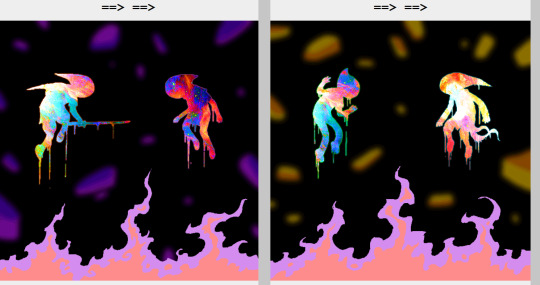
theyre finally arriving. holy shit . theyre COMING THROUGH THE WINDOW. JOHN AND JADE
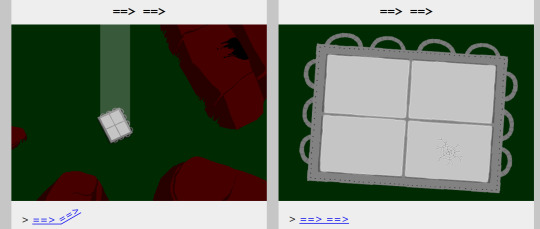
yeah ok so jade showed up and her and jane immediately got turned evil
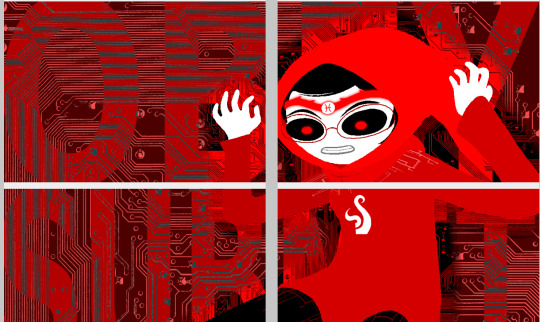
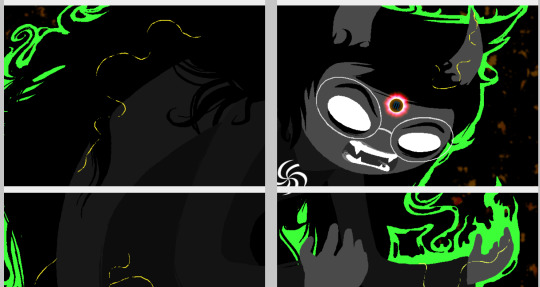
DAVE AND KARKAT HIIII

this is a CLASSIC dave/karkat mess around. if you know, you KNOW . shit had me ROFLing.

holy davesprite . i havent seen this mf since like RIGHT AFTER cascade. literally its been eons

TRUEE i think its a strider lalonde thing they looove to go on and on about random bullshit

hey its these bozos what up yall
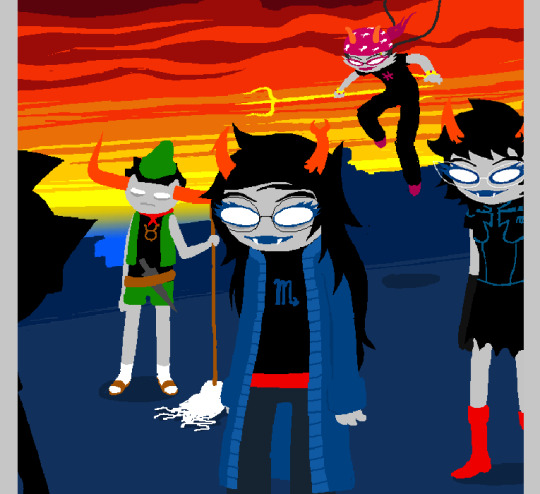
waitt theyre being friendly to each other? breath players CAN get along!!! this is huge news. especially for me.

this actually would be a hard ass shirt fr i need that shit

this is the reaction i get when i bring up minestuck to my friends... and im like guys please its actually fun i promise... .(im lying)
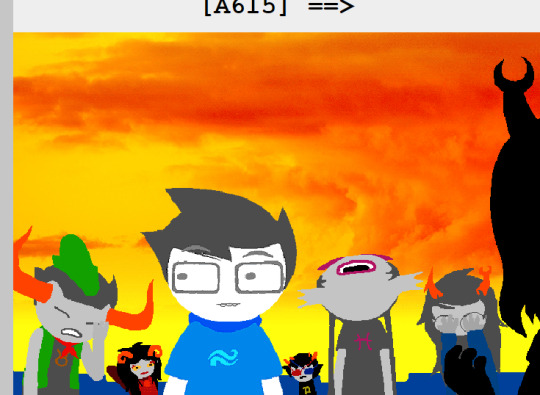
yo its the fan trolls what uppppp
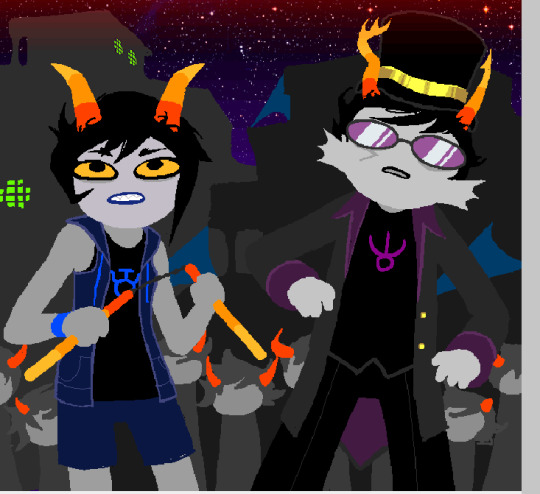
okay nice meeting you
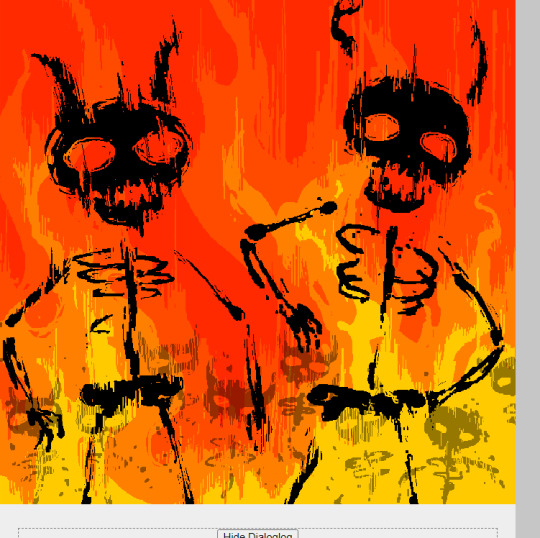
this is all very silly :D
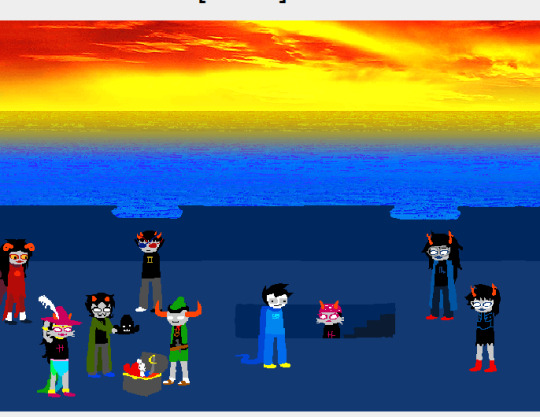
OH GOD WHAT HAPPENED TO YOU. WHY DO YOUHAVE EYES.... WHAT THE FUCK I DONT LIKE IT I DONT LIKE IT I ACTUALLY HATE IT GET IT OFF GET IT OFF
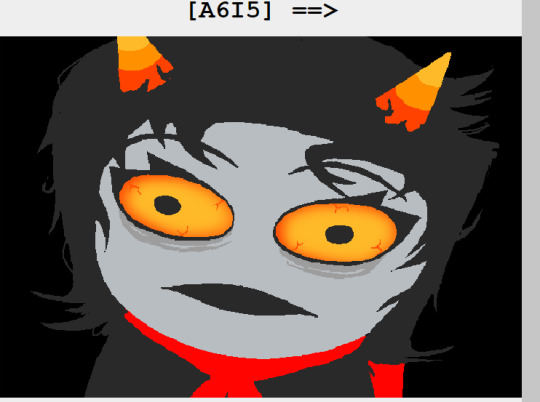
YES!!!!!!!! OKAYYYY TAVROS!!! stand up for yourself girl you are serving like crazy right now. i think maybe this is more meaningful than when he tried to kill her, cause that was just a too little too late type of thing where he wouldnt have actually accomplished anything by succeeding, and also had no chance of doing so. BUT realizing his CONFIDENCE and his FREEDOM actually is meaningful and it will accomplish things later on!!! :D YAY TAVROS

insane behavior
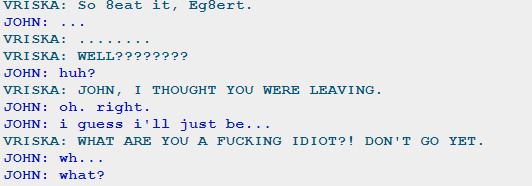
i think i agree with john here, i dont think it is out of line for him to hesitate in giving you the life ring. you dont have to be a good person to be a hero. but you do have to do... heroic things? like, ever? maybe once in your fucking life? when is the last time ANYTHING you did could be considered "heroic?" when you were alive, all you did was make everyone around you suffer. they had to kill you just to make sure you didnt doom them all. when youre dead, sure youre hunting down a weapon to kill the big bad monster, but you dont even seem to care about the millions of troll lives you are mind controlling against their will to be bait for your big mission. who the hell are you trying to save? the heroes that are alive in this story literally NEVER encounter the version of the villain that you are trying to stop. whats more, this big plan to use the your ghost army FAILS because the one who was doing basically ALL the legwork mind controlling most of the ghosts ditches you, and the only reason you still have an army by the end is because the guy you fucking bullied the whole time when you were alive (and a lot of the time you were dead) BAILS you out by ACTUALLY being a hero and a genuinely good person that doesnt need to MIND CONTROL PEOPLE to get them to follow him. look. i understand everything you are saying. about not having time to deal with the morals and ethics of what you are trying to accomplish. because the ends justify the means. but the thing is that NONE of it matters. YOUR PLAN FAILS. YOU GIVE UP and have an actual SATISFYING character arc. then it gets retconned and the main version of you goes back to being Worse. and then her plan...? succeeds? i guess? if succeeding means literally EVERY ghost in the army gets obliterated, the secret weapon deploying the four beta kids who are almost all killed by LE, and randomly davepeta being the one to throw him as well as themself into a blackhole. i guess if that counts as success, then congrats. you didnt even get to see that happen though, because you got ejected from the fight frame one. HOPE IT WAS WORTH IT!

anyway... what was i doing. oh yeah look at this. this is a bit sad
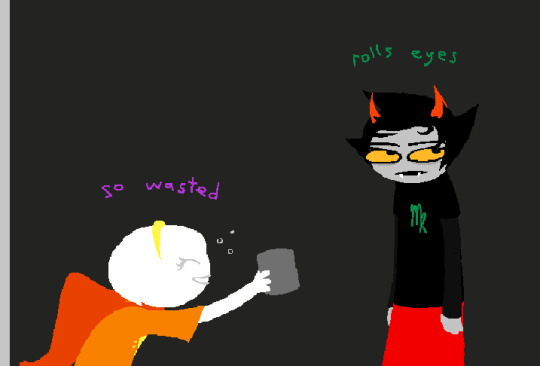
okay this is pretty real. even if it is nonsensical, and maybe a little bit problematic?

me talking about myself three images ago
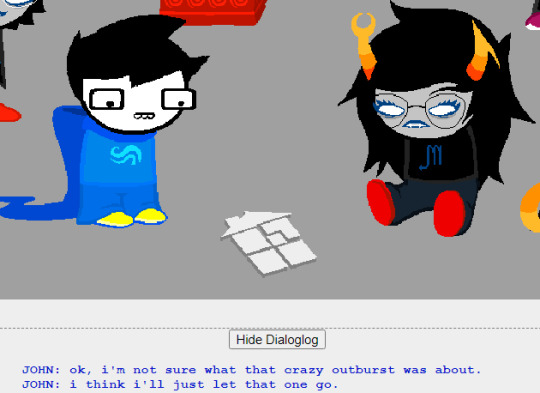
i like this panel. poor john cannot find his friends
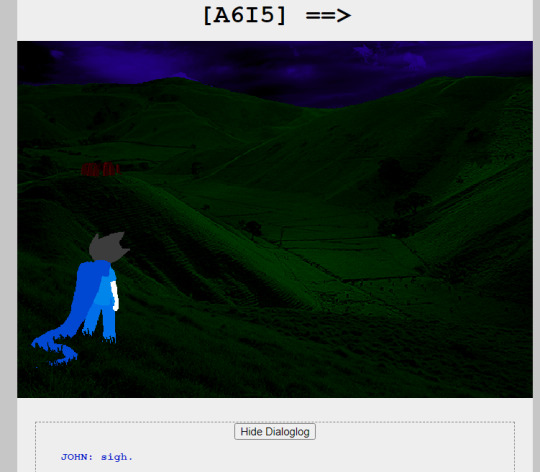
this is a very cool panel as well
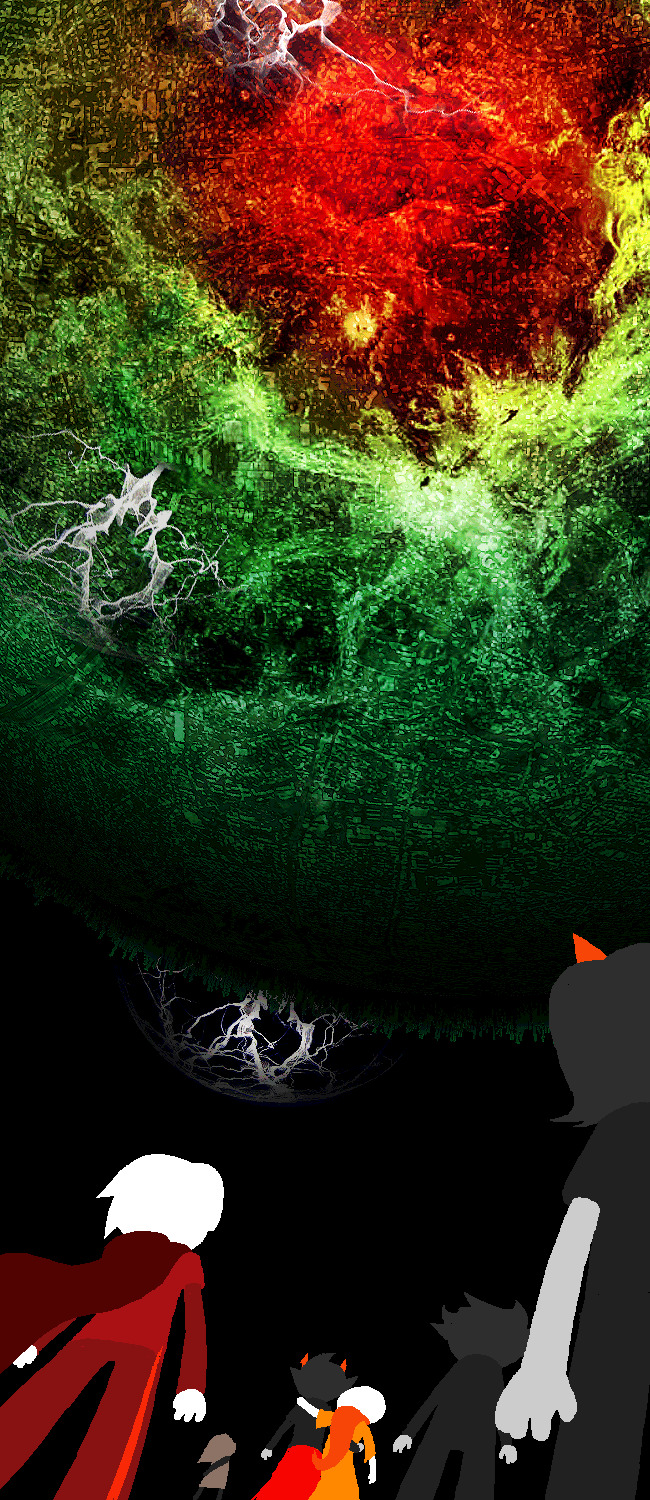
FAWK
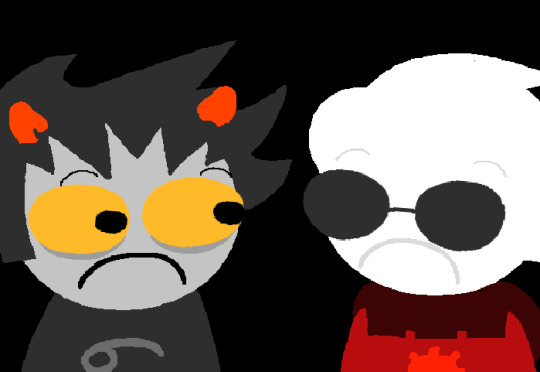
YOOOOOOOOOOOOOOOOOOOOOOOOO worlds most epic meetup
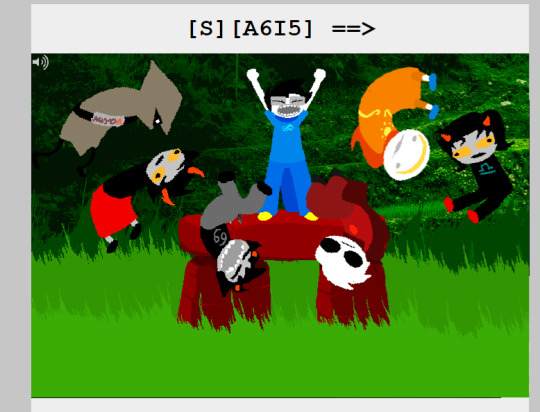
my worst nightmare
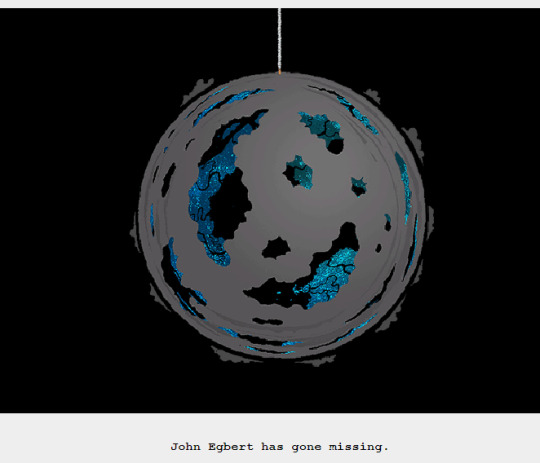
fucking scary ass motherfucker please get a grip. also brown contacts .
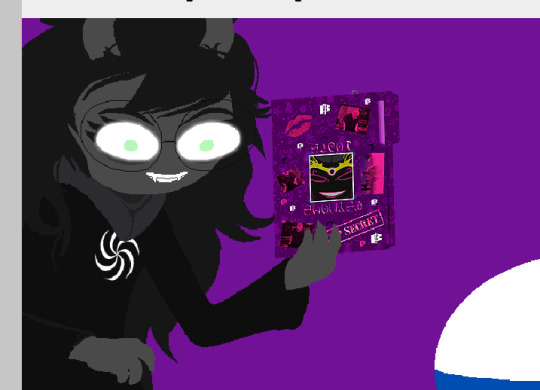
GOD. ROXY IS SO FUCKING REAL AND TRUE. THEYRE ACTUALLY MY GOAT ITS SO FUCKING INSANE HOW MUCH I LOVE ROXY
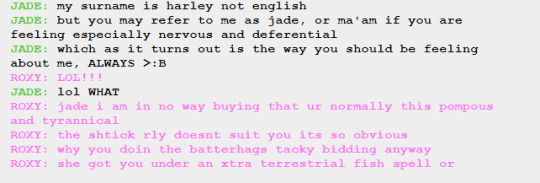
well. things are pretty bad right now! jade is evil jane is evil everyone is on random planets with no memory of how they got there john is missing. if i didnt know any better this might seem like the beginning of something really bad . but what do i know. anyway catch you on the next one. or catch me? joff i will see you next time. ok joff bye joff
1 note
·
View note
Note
#man even jro’s Optimus sucks if you read between the lines#the whole ‘mass arresting homeless people in the dead end and throwing them in jail because OP had a bad day’ that was Jro’s OP#the narrative presents his actions as heroic or badass action star tho so its less inclined to examine itself#unlike Barber’s work which does that rigorously
With the necessary context that I am happy to acknowledge that Barber did a lot of the most reflective stuff later, in phase three, with a benefit of hindsight Roberts did not have in 2012 or whenever, and that I do not even slightly think that Roberts would write that stuff the same in 2024... yeah, 100%. A lot of pre-war Optimus that we see is in fact being an asshole, but the comic presents it as otherwise, which is profoundly different to me than Barber making Optimus an asshole as a deliberate decision about his arc and narrative.
One of the things I think is also worth discussing re: MTMTE and cops is where Whirl fits into this. Whirl is the unambiguously 'bad' cop, whose brutality is never justified and whose arbitrary abuse of power is correctly seen as, well, awful. He's also the one character who is forced into being a cop against his will, and serves as an extension of the story about the senate's abuse of power via functionism. The clear takeaway here is that the powers-that-be abusing the system to force it to be violent and cruel is the problem, but that if left to the people who Want To Be There who are on the ground, things would be better. (Optimus or even Prowl, who IMO Roberts writes as explictly ennobled by his being a cop in a way Barber uhhh really doesn't IMO, are the good cops, who want to correct things, the story tells us. Prowl in Shadowplay is being ironically contrasted with how much he'll morally fall later and the fact the audience knows this. It's... striking! Anyway I'm off topic.)
But Whirl doesn't really... do much Optimus doesn't, to be honest. I mean. I guess Optimus never beats anyone up in their cell! But as you say, he has a bad day and goes and arrests everyone he can call a criminal (so: everyone) in the Dead End and locks them up; the difference is that this is framed as mildly amusing and unambiguously a Good Guy Action by the comic. The distinction is drawn not between what cops do but their motivations for doing it; Whirl's motivations are bad and he's doing it to The Wrong Person, so it's of course wrong. If only he had good motivations, and was harranguing real Evil Criminals, right? Whirl doesn't refute the 'MTMTE is fine with cops' thing as much as he exists as a contrast against which the rest can be judged as better, IMO! That's why he works under Optimus, who reprimands him; it's his role, to be the one stood next to Optimus making him look principled.
All of this is completely mainstream and par for the course in basically any piece of popular fiction, to be clear; this is completely unexceptional logic in pop culture. My point is more that people in fandom present MTMTE as being in some way anti-cop when not only is it not that, it's quite fascinated at times with what it sees as The Good Cops. (Roberts' first pitch was, remember, for a procedural series that was reused for the Prowl-Chromedome segments of Shadowplay! It's no surprise. The structure of the series he originally pitched is one that traditionally, well. Is about cops.)
Anyway, if fandom could come to grips with this element of the comic, it opens up a lot of opportunities to read against the grain and do something more transformative and critical with those elements, IMO, and refusing to do so because it feels kind of awkward to acknowledge only holds that possibility back. Rant over, sorry.
☕️ wild card (whatever you wanna talk about!)
It really annoys me that a whole segment of fandom treats Roberts' take on OP as 'the real one' compared to everything else in IDW1. I don't inherently dislike that he would choose to look at the inconsistent and bad writing OP got in phase one and go. Hm. Well. Let's quietly ignore that. I do in fact think choosing to ignore whatever the fuck Costa thought he was doing when Costa himself did not give a shit about his own work, for example, is what any reasonable writer would find themselves inclined to do, lmao.
But at the end of the day, in phases two and three, Barber wrote the bulk of Optimus' story, and took the reins on the character basically 100% outside some prequel flashback stuff. And he did not do what Roberts did. He chose to try and work the prior stuff into a characterization that re-contextualised it into something more coherent and self-aware of what a dick OP came across as a lot of the time. People will look at the super conventionally Heroic And Corrrect take Roberts did in a couple of (pre-canon!) stories, assume Barber must ALSO be doing this, see Barber do something different, and insist this proves Barber is an idiot with no understanding that his Optimus is frequently in the wrong. It's incredibly annoying, lol.
ALSO, why do so few people seem to grasp that the cop backstory was introduced in Chaos by Roberts..?? That was not Furman, Costa or Barber, all of whom I see it attributed to for some reason. Whenever people are like 'UGH I hate coptimus' but then are like 'I guess he was OK when JRo wrote him though' I'm just. Throws my hands up! THAT WAS FROM CHAOS. HE DID THAT. I suspect admitting this would complicate people's 'MTMTE is universally the most socially progressive IDW1 thing, everything else sucks and never does even One Thing as well or better' dichotomy some people are stuck in, or something. (And frankly, MTMTE is very happy in Shadowplay to run with the Good Cops Fighting Corruption stock storyline, which Barber would later on complicate a lot in the OP ongoing.)
tl;dr Roberts wrote an Optimus that was more in line with people's concept of G1 Optimus, but that doesn't mean his is the sole real 'correct' one in IDW1, next to all the takes that... draw on prior IDW1 stuff. Stop getting mad Barber didn't run with the way Roberts wrote him in a couple flashbacks, it's disingenuous.
60 notes
·
View notes
Note
Something that annoys me about this “if you say this character is evil, you’re reading MDZS wrong” is that MXTX didn’t actually mean to write this “oh we’re all grey” story. She openly dislikes JGY, and she thought of JC as WWX’s crazy ex shidi with deep problems. Like, they aren’t there for you to justify their actions (god knows they did it a lot of times already) or to try to make them look good by putting them in the same bag as the protagonists just because “they’re all well fleshed and complex characters that are morally grey and flawed”.
What a way to miss MDZS’s actual message. It saddens me because WWX’s hero journey is as tragic as it is beautiful. I wish I was as brave as him, to oppose injustice even if I am alone against the world.
Yeah I totally get you anon! I’m not sure why it’s so hard for people especially in MDZS to figure out (though I have seen it for her other two works too, but not to the same extent), but she’s actually pretty clear in her work on who’s admirable and who’s not. Even when she’s deliberately using framing to get you to question what you’re hearing versus what you’re seeing, it’s pretty clear who you’re supposed to doubt the narrative about and who you’re not. Jin Guangyao is revealed as the main villain less than halfway through the book, after all!
There are works where that would be an appropriate reaction. Sometimes the heroes can too, be deeply flawed, negative people. But that’s not where MXTX is writing from and from what danmei/xianxia I’ve consumed so far, she has some of the least morally gray characters scattered through her works. She’s clearly very big on the idea that people can and will choose to do good if they want, and also that while it certainly doesn’t exempt them from flaws, that also flaws do not have to be hero killers.
Wei Wuxian is killed not because he is occasionally a little tactless and also keeps people at a distance because it is a very slow journey to trust them enough, but because his morals and willingness to stand up for them are inconvenient to the people in power. He is a flawed, well rounded character, but that’s not why he was hated or why he died. Similarly Jiang Cheng having sympathetic backstory and losses does not exempt him from being a shitty person because as we see in the novel, he’s not the only person who loses everything in his life, but he’s the one who decided to stew in it.
MXTX is so big on your choices define who you are, not your position or history. What matters most is what you do in the shadows and the light. That’s why Wei Wuxian is so heroic, he is always willing to stand by his morals even to the bitter end. It is tragic, but also it’s so full of hope, even! Look at what he has in the end of the story, it is so solidified that his choices and sacrifices did make a difference! Lan Sizhui is alive, well raised and cared for, because Wei Wuxian made that sacrifice for him. Mianmian is out living her best life with Mr. Mianmian and Mini Mianmian because she chose to follow Wei Wuxian’s bravery and has never regretted it. Jin Ling is blossoming under his patient guidance into a wonderful young man who can hold his head high with pride. It may be tragic, but so much good came from it too even if in the immediate moment it was hard to see.
And you know what, anon? We can be that too. Maybe not as far as he goes, but we can still shine bright and make the choices that have positive impacts down the road. We can be Mianmian, inspired by him to do the same that he did on the scales that we can.
The world may be a big thing to save, but we can always save little pieces of it here and there and the more of us that there are, the more powerful it becomes.
#mdzs#wei wuxian#wei wuxian is our guiding light#canon jiang cheng#asks#anon#anon asks#morally gray is a useless term in this fandom
95 notes
·
View notes
Text
Now that all three episodes are done... I've got some thoughts about the main mystery of Soldier Boy.
First off, not only will they be tackling the toxic masculinity at the core of Soldier Boy's personality (and I think we'll be seeing other characters grappling with it like Billy, Hughie, Homelander, etc.) but with him I also think we're getting into the beginning of the systemic brutality supes introduced by patrolling the streets to stop crime - a reference to the systemic brutality that persists in the real world, especially against minorities; which the show has hinted at in earlier seasons and progressively ramped up with every new season.
I mean it's at the heart of Marvin's issue with Soldier Boy - the very reason his family fell apart was because of him in ways we don't know yet. It dealt with the lawsuit, yes, but I can't remember what the lawsuit was about if they ever mentioned it. Just that it was against Vought. I had a feeling there was going to be something between Marvin and Soldier Boy, like they had a conflict wholly different from the main beef between the boys and the supes. Mainly from social media, it seemed like they were doing more together and had a closer bond than a few of the others. Hell, a source of the conflict might be Soldier Boy siding with the Boys against Vought - which rubs Marvin the wrong way because of the pain Soldier Boy caused his family, and others through his negligent and excessive actions.
And not to scapegoat him because what Soldier Boy did was inexcusable, but a way they will probably try and frame it within the story, as touched upon in interviews with Jensen, is his excessiveness in the battlefield is unresolved trauma from the war. I think this is clear when we see Soldier Boy going in on that guy with his shield and, even though we know they're toast, Soilder Boy hammers away. I think he sets himself on autopilot and goes at it until the episode runs its course. It worked during the war. The only problem is super heroics isn't war. Vought never should have sent him out in cities. Though Soldier Boy is still at fault here for not wanting to retire, which I think will tie in to both Homelander and Billy's arcs surmised by Homelander perfectly of people trying to make them retire, but they don't want to.
Soldier Boy didn't think there was anything wrong with him. And, given his prejudices we know he has due to Jensen telling us he's the most cancellable man on Earth, he probably didn't see anything wrong with the collateral damage he caused nor the people who were hurt in the crossfire or, like the man Blue Falcon killed, were mistakenly accused of wrongdoing.
Which I think is also why brutality by supes (which, at this point I'll say is supposed to reflect police brutality) will be a major conflict within A-Train's season storyline and explains why he is doing a Kendall Jenner-esque Pepsi commercial in his new suit. It also ties into recurring themes of corporations creating inauthenticity when pursuing real social issues through a capitalistic lens. It's also refreshing to see the supe lens turned inwards because for all of season 1 and most of season 2, with supes in the military whatnot, we got the metaphor of the supes being a representation of the American aggression overseas and how easily killing indiscriminately can be covered up when you are fighting an 'enemy', when you have the resources to cover your ass and "make sure nothing ever changes". But we also know Vought and the government do it here, too. We were introduced to it. And it was the major driving force of both Hughie and Billy's arcs in the first season. However this season we're getting a look at truly how pervasive this issue is, spanning decades and throughout the superhero community. So it makes sense that Hughie turned to a scorched Earth strategy because in this world the bad guy, Edgar, really has thought ten steps ahead on EVERYTHING.
Like, the Victoria reveal alone showed him how far down the line he's been planning what I think was his ultimate end goal from before Homelander - which was to get rid of supes once and for all.
He pushed to have supes in the military because he knew how disastrous it would be. He had someone on the inside pushing his second interest, which was to make sure supes never get in the military. His company perfects the V24 formula after rigorous testing and, like Bob Singer said, makes bank for the rest of his life off a government contract. I bet he came up with this plan after dealing with the ultimate diva superhero - Soldier Boy himself.
Which is why I think he might join with the Boys against Vought. Because he took down Soldier Boy.
I think bringing them down to Nicaragua was just an excuse to have the Russians 'kill' Soldier Boy and Vought would ferry him away so he can't bother anyone ever again. I think they did it - Edgar did it - because after all these years Soldier Boy started becoming too wildly than even they could control. Which is why he's so calm when dealing with Homelander, because he must have something to take care of him with. I mean, sure, Victoria would probably blow him to ashes. But also something else. This man does not go into anything without ten back-up plans.
However even the most prepared man can be caught off guard, and it's usually when whoever he's up against makes a choice against their nature, or one that is too risky. He's so safe and logical, he thinks everyone - at the end of the day - will make the same choices. He didn't expect Billy to finally show mercy on a supe, and give up any chance of being with his wife. He didn't expect Homelander to blow up like that at his birthday celebration. He didn't expect Stormfront's nazi past to ever see the light of day.
So I think them freeing Soldier Boy will be an ace up their sleeve in the fight against Vought, even if he goes back to work for the very same company. At least it might unsettle Edgar enough he'll be distracted. It might have him on edge if it's revealed he had a part to play in Soldier Boy's disappearance.
There's more I could say but don't see how I can make it tie-in so I'll snippet it in this paragraph. Soldier Boy's past being tied with Black Noir's in a way I hope we get from Black Noir's pov because I'm sure Soldier Boy had something to do with why he ended up scarred, even if it was Noir being in the wrong place wrong time. Marvin and Monique's divorce and the fact that her new beau might be drinking the kool-aid from Homelander. MORE OF FRENCHIE'S BACKSTORY (he's a little Dean-coded, too, no?) Kimiko working towards pushing past the trauma that keeps her from speaking, and what that means for the musical finale. How we're peeling back the layers on Soldier Boy and Vought's past before even meeting him in person, and what that means for the solid gold dancers bts photo that was shared (was it in the present or in the past?) How Marvin's shirt had NWA on it and, as Laz said, Marvin's shirts hint at plot points in the episode and I think the plot point was Fuck the Police.
I think I'll wrap this up and say Soldier Boy really adds an extra and much needed angle that the Boys were missing. I think this season we've seen Hughie and Billy go through their arcs and now they're in the free fall between arcs where they don't know what to do or who they are. I think we are going to see major developments with Marvin, Frenchie, and Kimiko (which I am EXCITED for). I think that Edgar is right, and that there shouldn't be any more superhero teams because it just leads to mess after mess. And even though that's how it might end, Homelander won't go down without a fight and will make good on his promise of scorched earth.
I still think (and hope) we get some gay Soldier Boy. Villainous dicks can still suck some dick lol.
Also it'd be very funny if Crimson Countess really fell into the trap of loving someone who wasn't into her (even though that might still be the case, I would personally prefer it being because he likes men more than women; but will also accept him saying she's gotten too old for him with a side of him being in a three-way with another man). Plus it would mirror the situation between Deep and Cassandra perfectly.
There's still more that will be revealed throughout the season, but these three episodes really laid the groundwork for everything I'm betting the show will tackle in the rest of the season.
#the boys#the boys s3#the boys s3 spoilers#soldier boy#hughie campbell#billy butcher#homelander#marvin t. milk#mother's milk#kimiko#frenchie the boys#starlight the boys#a-train the boys#the deep the boys#black noir#the boys s3 review#grace mallory#i don't think maeve will be featured that much in this season unless she and billy have a moment#only because of the characters she doesnt have a story that others arent already doing#she's helping to take down homelander but she's in the shadows for now#this went on longet than i thought lol
248 notes
·
View notes